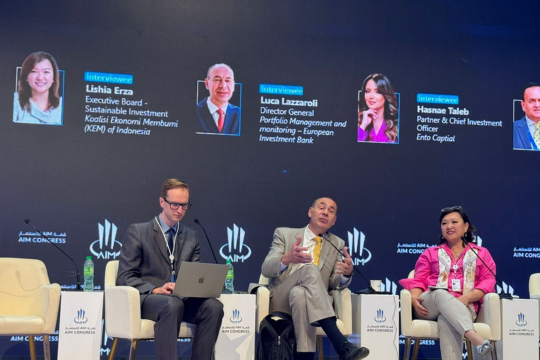Sustainable Plates: Where Tech Meets Food, Finance, and Emission
On October 28, 2024, Ideafest gathered thought leaders to address an urgent topic: “Sustainable Plates.” Insan Syafaat from PISAGRO kicked off the discussion by highlighting agriculture's vital role in Indonesia's food security. Despite its resilience and significant contribution to employment, Indonesia faces serious challenges in this realm, as underscored by the Global Food Security Index (GFSI).
With a GFSI score of 60, Indonesia ranks fourth in ASEAN, far below Singapore, which leads despite its limited agricultural resources. This disparity raises a critical question: How can we improve our food security?
To combat these challenges, Indonesia has launched several initiatives aimed at diversifying food sources and enhancing overall resilience. The establishment of the National Food Agency and National Nutrition Agency marks significant steps forward, with programs like B2SA (Diverse, Nutritious, Balanced, and Safe) aiming for tangible improvements by 2045. Yet, as Syafaat pointed out, simply creating these initiatives is not enough; real change requires action and commitment.
Financial inclusion for farmers emerged as a significant obstacle. Many farmers lack access to modern technologies and resources that could enhance their productivity. Without addressing this gap, the agriculture sector risks stagnation. Furthermore, Syafaat warned that maintaining traditional agricultural practices could lead to an alarming projection of over 1.356 gigatons of greenhouse gas emissions by 2100. This figure serves as a wake-up call, urging immediate attention to sustainable practices.
The discussion flowed seamlessly into a panel moderated by Indra Sari Wardhani from Coaction Indonesia, where experts shared their insights on innovative strategies for improving food security. Nurdana Pratiwi of Econusa illuminated the challenges faced in East Indonesia, where sustainable land use is critical for local communities. Her organization supports these communities in optimizing their land for food production, demonstrating that local solutions can yield significant results.
Cindi Shandoval from Pinaloka Siak added depth to the conversation by sharing her work in Siak, where 57% of the area is covered by peatland. She has initiated a sustainable tourism project that not only promotes local cuisine but also creates economic opportunities through Heritage Dining, proving that culture and sustainability can go hand in hand.
Saniy Priscilla of Pratisara Bumi Foundation emphasized the importance of merging traditional and modern agricultural practices to ensure sustainability while minimizing environmental impacts. This integration is not just beneficial; it is essential for the future of farming in Indonesia.
Rama Manusama from Katalys Partners brought forth the idea of responsible capitalism in agriculture, asserting that innovative solutions are crucial for supporting smallholder farmers, who form the backbone of the agricultural sector. This perspective echoed the sentiments of Reihan Adilla from Agrilabs, who highlighted the role of climate technology in empowering small farmers. By leveraging data-driven methods, farmers can optimize their yields and navigate the challenges posed by climate change.
Vivi Laksana from Equatora Capital rounded off the panel by discussing the significance of green financing. She argued that without investment readiness, sustainable agricultural practices will struggle to take root. This interconnectedness of finance and sustainability is critical to fostering an environment where agricultural innovation can flourish.
As the discussions at Ideafest drew to a close, the consensus was clear: addressing sustainability in agriculture and food security is not merely a choice but a necessity. The path forward demands a concerted effort from government, local communities, and the private sector to develop practical and innovative solutions.
Indonesia possesses immense potential to enhance its food security significantly. By harnessing technology, fostering community engagement, and utilizing local resources, we can ensure that our agricultural sector is not only resilient but also sustainable and inclusive. The time for decisive action is now. The future of our food security depends on it

